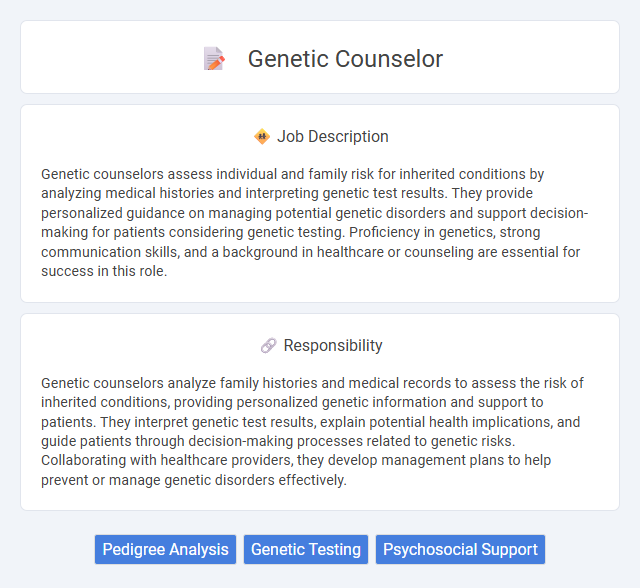
Genetic counselors assess individual and family risk for inherited conditions by analyzing medical histories and interpreting genetic test results. They provide personalized guidance on managing potential genetic disorders and support decision-making for patients considering genetic testing. Proficiency in genetics, strong communication skills, and a background in healthcare or counseling are essential for success in this role.
People who have a strong interest in genetics and healthcare, paired with excellent communication skills, are likely suitable for a career as a genetic counselor. Individuals who are empathetic, detail-oriented, and comfortable discussing complex and sensitive health information may find this role fulfilling. Those who prefer routine or less emotionally intense work might have lower probability of thriving in this profession.
Qualification
Genetic counselors require a master's degree in genetic counseling from an accredited program, integrating coursework in human genetics, psychology, and counseling techniques. Certification by the American Board of Genetic Counseling (ABGC) or an equivalent body is essential for professional practice, ensuring expertise in interpreting genetic test results and advising patients. Strong communication skills and a background in molecular biology or genetics further enhance their ability to support individuals and families in understanding hereditary conditions.
Responsibility
Genetic counselors analyze family histories and medical records to assess the risk of inherited conditions, providing personalized genetic information and support to patients. They interpret genetic test results, explain potential health implications, and guide patients through decision-making processes related to genetic risks. Collaborating with healthcare providers, they develop management plans to help prevent or manage genetic disorders effectively.
Benefit
Genetic counselors likely offer significant benefits by helping individuals understand their genetic risks, which can improve personalized healthcare decisions. They may increase the probability of early detection and prevention of inherited conditions, enhancing patient outcomes. Their expertise could also reduce patient anxiety by providing clear, accurate information about complex genetic information.
Challenge
Genetic counselor roles often involve navigating complex emotional and ethical challenges due to the sensitive nature of genetic information. They probably face difficulties in interpreting ambiguous test results while providing clear, compassionate guidance to patients. Balancing scientific uncertainty with patient care may lead to ongoing professional and emotional strain.
Career Advancement
Genetic counselors can advance their careers by obtaining specialized certifications in areas like cancer genetics or prenatal genetics, enhancing their expertise and marketability. Pursuing leadership roles such as clinical director, research coordinator, or faculty positions in academic settings offers opportunities for increased responsibility and influence. Engaging in continuous education and contributing to genetic research or policy development further positions genetic counselors for career growth and recognition in the healthcare field.
Key Terms
Pedigree Analysis
Genetic counselors specializing in pedigree analysis systematically gather and interpret detailed family health histories to identify inherited conditions and genetic risks. They utilize pedigrees to map relationships and track patterns of genetic disorders across generations, aiding in risk assessment and personalized care recommendations. Expertise in pedigree analysis enables counselors to guide testing decisions and support patients in understanding complex genetic information.
Genetic Testing
Genetic counselors specialize in interpreting genetic test results to assess the risk of inherited conditions and guide patients through decision-making processes. They analyze complex genomic data to provide personalized recommendations for genetic testing options and subsequent medical management. Expertise in genetic testing technologies, such as next-generation sequencing and chromosomal microarray analysis, is essential for accurate risk assessment and patient counseling.
Psychosocial Support
Genetic counselors provide critical psychosocial support by helping individuals and families understand the emotional and psychological impact of genetic conditions. They assess coping mechanisms, facilitate decision-making, and offer resources to manage anxiety, grief, and stress related to genetic risks. This support enhances patients' overall well-being and empowers informed healthcare choices.
 kuljobs.com
kuljobs.com